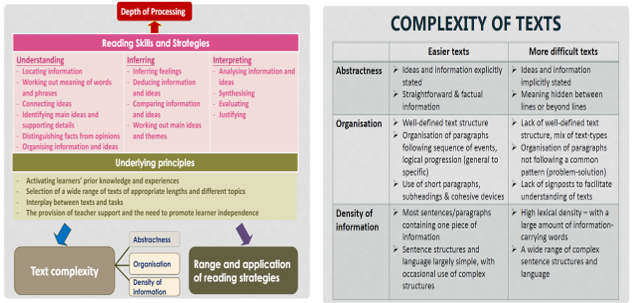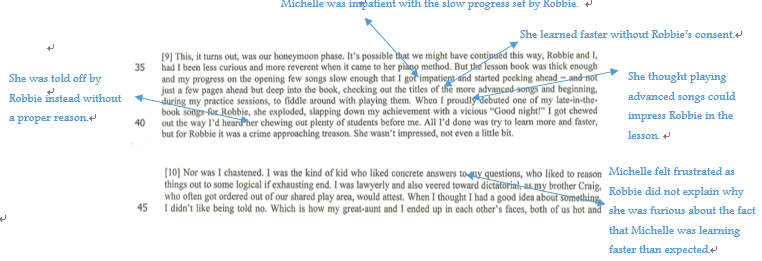Read with purpose and meaning : Teaching Inferring Skills (HKDSE Paper 1)

Introduction
In recent years, DSE Paper 1 (Reading Comprehension paper) is said to be getting more and more arduous. Most candidates unanimously grumble about the fact that they invariably scratch their heads when trying to decipher what the questions mean and what the articles imply. What reading skills are important? The following tables[1] encapsulate the skills which are required and tested in DSE Paper 1. Most, if not all students, find the inferring and interpreting skills hard to learn. These skills also pose a difficulty to most novice teachers as they find it challenging to get these skills across in the classroom.

Inference
In more difficult texts, as mentioned in the above table, authors deliberately skip some information such as details of the event, emotions of characters involved and motives. Intensive reading, in this sense, is more or less the same as solving a mystery like what a detective does. That said, it is the reader’s job to fill in these ‘gaps’ through working out the implications and making use of requisite (or prior) knowledge to fill in those gaps. Let’s take a look at the following example.
‘Marie is cooking breakfast for Johnny. She bought the freshest and the most nutritious ingredients at the market very early in the morning. She needs to ensure that Johnny will be energized after the meal before sitting the first DSE exam. Giving him love and everything he needs to be successful since he was an infant is Marie’s sole goal. The breakfast she has prepared is her language of love.’
By reading between the lines, we garner the following information. First, Marie is an adult (e.g. ‘Taking care of Johnny since he was an infant’). Second, she is also willing to make sacrifices for Johnny (e.g. ‘Buying the freshest and the most nutritious ingredients at the market very early in the morning’). Finally, she loves Johnny very much. (e.g. ‘The breakfast she is preparing for Johnny is her language of love’). Based on the evidence given, we conclude that Marie is most likely Johnny’s mother.
How do we reach this conclusion? Some tools are helpful in helping us infer the intended meaning.
1.Observation
Students are encouraged to look for clues in the text by careful reading. With reference to the above example, they should be aware of facts including ‘taking of Johnny since he was an infant’, ‘Buying the freshest and the most nutritious ingredients at the market very early in the morning’. Most mothers would do the same in reality.
2. Cause and effect analysis
Why does Marie ‘buy the freshest ingredients’ very early in the morning? Why does ‘taking care of Johnny and giving everything he needs to be successful is her main goal”? There is a purpose for the writer to leave these clues in the text. The reader should probe into these questions.
3. Prior/Requisite knowledge
Teachers can prompt students to think about who, in their lives, will probably do the same as Marie does.
4. Prediction
Teachers can also ask students to explain why Marie cooks a nutritious breakfast for Johnny before his taking the first public examination.
By resorting to the above inferring skills, it is a piece of cake to explain why Marie is most like to be Johnny’s mother. First, mothers’ unconditional love to their children is universal. Their unconditional love is always commended and is a recurring theme in a variety of texts, novels and movies. Because of her unconditional love to Johnny, Marie is willing to sacrifice her sleep time to buy the best ingredients for her son’s breakfast. In addition, it is only mothers who would put their children as the top priority in their lives. Therefore, Marie does not mind hovering around her son and giving him everything he needs to be successful. Hence, we can predict that Marie hopes Johnny can do well in the public examination by having a nutritious meal. Therefore, Marie should be Johnny’s mother following this line of reasoning. Novice teachers can teach these inferring skills using simple examples from our daily lives.
DSE 2023 Part B
Upon helping students understand the essential inferring skills from simple examples, teacher can proceed to more difficult texts in the past papers. In the following, Text 4 ‘Michelle Obama’ in DSE 2023 Part B2[2] will be used for discussion. Questions 46, 55, 60[3] in DSE 2023 Paper 1 Part B2 will be used to examine how inference works step by step. It is beyond doubt that Text 4 ‘Michelle Obama’ is a meaningful text in which the writer takes the chance to commend those women on how they shaped Michelle to become what she is today through a series of anecdotes in her childhood. Some information is implicitly left out in the article for the reader to work out the implication, though.
Q.46 With reference to paragraph 1, what is the connection between Michelle Obama’s personal essay and Mother’s Day?
By rephrasing the above question, it will be :
‘Why did the author write the personal essay for Mother’s Day?’
Traditionally, Mother’s Day is meant to show great respect for mothers who have made sacrifices and have devoted their lives in raising and nurturing their children (prior knowledge). According to paragraph 1, the author remembers how her mother and other females taught her in her childhood (observation). She is grateful for their teaching. Hence, she would like to take this opportunity to show her respect to these females through sharing her wonderful memories (conclusion).

The mystery is solved. The answer is :
‘The essay shows Michelle’s respect to her mother and other females through sharing her memories of them in honour of Mother’s Day.’
We infer the answer through observation and prior knowledge.
Q.55. With reference to paragraph 8, answer the following questions.
(i) What was ‘deeply buried’ (line 31)?
(ii) How was this expressed by Robbie?

By observing paragraph 8 in detail, we understand that the author, who enjoyed learning, progressed satisfactorily through constant practice (observation). While she demonstrated the result of her hard work through playing in front of Robbie, Robbie could not hide her ‘outright pleasure’ (line 31), i.e. her pride and joy over the author’s improvement (observation, prior knowledge ) through ‘unpursing her lips (line 33)’ (observation). When we achieve flying colours in examinations, our mothers usually beam with delight to show their ‘outright pleasure’. Therefore, it is sensible to say that Robbie’s joy was expressed through her little gesture, ‘urpursing her lips (line 33)’. Robbie’s emotion is implicitly communicated to the reader.
Hence, the answer for (i) is:
‘Robbie’s joy over Michelle’s performance’ was deeply buried.’
The answer for (ii) is :
‘Her joy was shown in her lips unpursing (slightly).
Q.60 Explain Michelle’s frustration when she says ‘Nor was I chastened’ (line 42).
It is crucial that students do not misinterpret the question. They are NOT expected to explain why Michelle ‘got chewed out’. Instead, they are tasked to explain what made her frustrated in her learning experience.

Based on our observation, there are two possible explanations. First, it is very conspicuous that Michelle did not receive a proper and convincing reason from Robbie (observation) to explain why she was not allowed to play more advanced songs. In reality, when we are not allowed to do something without any explanations from our parents, we would certainly feel frustrated. It is very natural that young Michelle would feel frustrated (prediction) as well. The second one is more implicit. Michelle was eager to learn faster by practising more advanced songs (observation). Nevertheless, it offended Robbie as she slapped her down by saying ‘Good night!’ (observation). Robbie’s brusque response means she did not allow Michelle to skip to more advanced songs without her consent (Prediction). Looking back on my childhood, my mother used to stop me from doing something I was eager to do without telling me why. I surely felt frustrated. Therefore, when Robbie, a mother figure to young Michelle, did not allow Michelle to practise more advanced songs, it is understandable that young Michelle felt frustrated. Students can choose either of the explanations to answer the question.
Conclusion
To conclude, we can only culminate intensive reading skills through reading a wide variety of texts and genres. More importantly, we, as readers, should always observe details, understand the causal relationship, analyze the text and predict the possible outcomes in the reading process. There is no shortcut to success but it is never too late to start the training.
References
English Language Education Section, Curriculum Development Institute. Understanding and Interpreting the English Language Curriculum for New English Teachers. Education Bureau.
Hong Kong Examinations and Assessment Authority. (2023). English Language Paper 1 B2 Reading Passage, Text 4 (pp.1-3). HKEAA.
Hong Kong Examinations and Assessment Authority. (2023). English Language Paper 1 B2 Question-Answer-Book (pp.1-4). HKEA.
[1] English Language Education Section, Curriculum Development Institute. Understanding and Interpreting the English Language Curriculum for New English Teachers. Education Bureau.
[2] Hong Kong Examinations and Assessment Authority. (2023). English Language Paper 1 B2 Reading Passage, Text 4 (pp.1-3). HKEAA.
[3] Hong Kong Examinations and Assessment Authority. (2023). English Language Paper 1 B2 Question-Answer-Book (pp.1-4). HKEA.